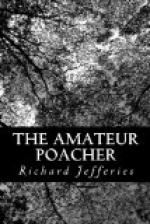Everywhere the apple-bloom; the hum of bees; children sitting on the green beside the road, their laps full of flowers; the song of finches; and the low murmur of water that glides over flint and stone so shadowed by plants and grasses that the sunbeams cannot reach and glisten on it. Thus the straggling flower-strewn village stretches along beneath the hill and rises up the slope, and the swallows wheel and twitter over the gables where are their hereditary nesting-places. The lane ends on a broad dusty road, and, opposite, a quiet thatched house of the larger sort stands, endways to the street, with an open pitching before the windows. There, too, the swallows’ nests are crowded under the eaves, flowers are trained against the wall, and in the garden stand the same beautiful apple-trees. But within, the lower part of the windows—that have recess seats—are guarded by horizontal rods of iron, polished by the backs of many men. It is an inn, and the rods are to save the panes from the impact of an excited toper’s arm.
The talk to-day, as the brown brandy, which the paler cognac has not yet superseded, is consumed, and the fumes of coarse tobacco and the smell of spilt beer and the faint sickly odour of evaporating spirits overpower the flowers, is of horses. The stable lads from the training stables far up on the Downs drop in or call at the door without dismounting. Once or twice in the day a tout calls and takes his ‘grub,’ and scribbles a report in the little back parlour. Sporting papers, beer-stained and thumb-marked, lie on the tables; framed portraits of racers hang on the walls. Burly men, who certainly cannot ride a race, but who have horse in every feature, puff cigars and chat in jerky monosyllables that to an outsider are perfectly incomprehensible. But the glib way in which heavy sums of money are spoken of conveys the impression that they dabble in enormous wealth.
There are dogs under the tables and chairs; dogs in the window-seat; dogs panting on the stone flags of the passage, after a sharp trot behind a trap, choosing the coolest spot to loll their red tongues out; dogs outside in the road; dogs standing on hind legs, and painfully lapping the water in the horse-trough; and there is a yapping of puppies in the distance. The cushions of the sofa are strewn with dogs’ hairs, and once now and then a dog leisurely hops up the staircase.
Customers are served by the landlady, a decent body enough in her way: her son, the man of the house, is up in the ‘orchut’ at the rear, feeding his dogs. Where the ‘orchut’ ends in a paddock stands a small shed: in places the thatch on the roof has fallen through in the course of years and revealed the bare rafters. The bottom part of the door has decayed, and the long nose of a greyhound is thrust out sniffing through a hole. Dickon, the said son, is delighted to undo the padlock for a visitor who is ‘square.’ In an instant the long hounds leap up, half a dozen at a time, and I stagger backwards, forced by the sheer vigour of their caresses against the doorpost. Dickon cannot quell the uproarious pack: he kicks the door open, and away they scamper round and round the paddock at headlong speed.




